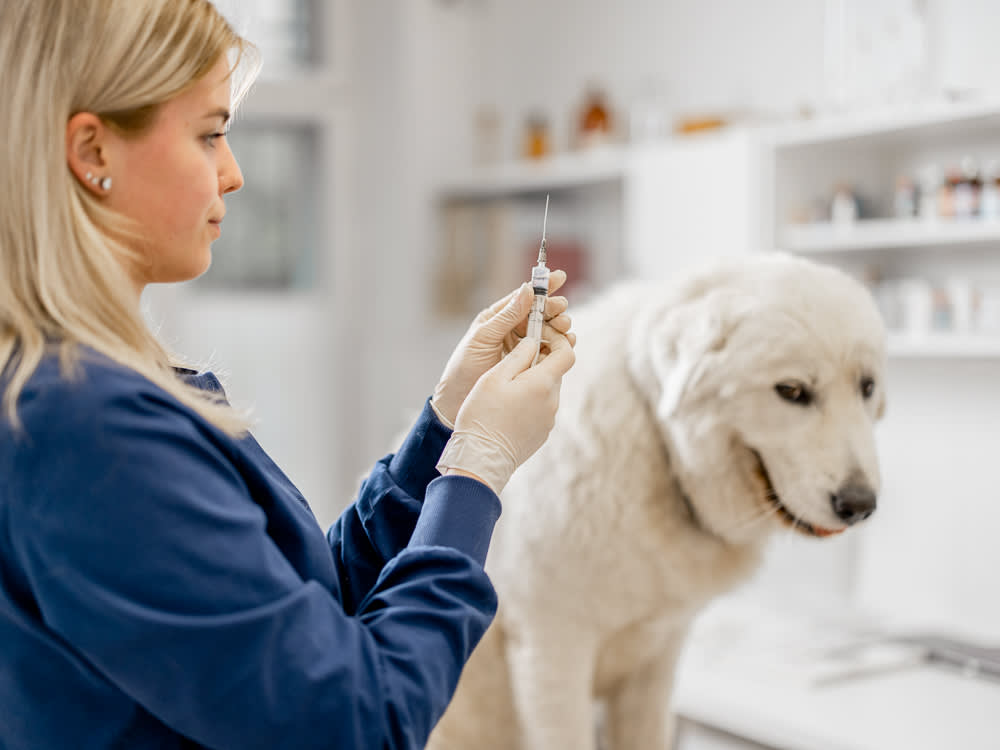Titer Tests: An Alternative to Annual Vaccinations?
Learn about how this test can help protect your pup.

Share Article
In this article:
What Are Titer Tests For Dogs? How Much Does a Titer Test Cost? What Immunities Can a Titer Test Check? What Are Titer Test Limitations? Risks Associated WIth Titer Testing Benefits Of Titer Testing For Dogs
By now you know the importance of vaccines (for pets and humans!). They protect your dog from diseases like canine parvovirus, canine distemper virus, rabies, and more. That’s why you mindfully take your new pup in for their puppy shots and routinely bring them back to the vet for a booster when that reminder postcard arrives.
Most experts agree that vaccines are critical for the overall health and wellness of dogs (and cats). But many also agree that giving vaccination shots for dogs yearly when they aren’t needed exposes animals to unnecessary hazards.
That’s where a titer test for dogs comes in. Titer testing pets can ensure protection from infectious diseases while minimizing over-vaccination side effects. Keep reading to learn what exactly the titer blood test for dogs is — and whether or not it’s right for your dog.
What are titer tests for dogs?
Titer tests are among the tools that can be used to help minimize the risks of both infectious diseases and unnecessary vaccinations. A titer test is an antibody blood test that can tell you if a previous vaccine is still protecting your dog’s immune system. If it’s still working by producing antibodies, you don’t have to revaccinate your pet yet.
Dr. Evelyn Sharpopens in new tab, a veterinarian in Santa Cruz, California, has used titer tests with her own dogs since she began practicing veterinary medicine in the ’90s. The first dog she regularly tested was her Border Collie mix, Ace. Titer tests showed that the protection provided by Ace’s initial puppy series and one-year booster lasted the rest of his life. With the recent availability of in-practice titer test kits for dogs — VacciCheck from Biogal Laboratories and TiterCHEK from Synbiotics Corporation — titer testing for dogs has become even easier to do.
Because the newer titer test kits are affordable, accurate, and can be run in-house (rather than by a lab), Dr. Sharp suggests titer testing as part of preventive care. With the information she gets from the titers, she can provide a customized vaccination protocol for each dog, keeping the dog well-protected while minimizing the risk of over-vaccination.
What, exactly, is involved in titer testing?
A “titer” is a method of measuring antibodies in a blood sample for specific diseases. Your vet will draw a small amount of blood and then run that blood through the titer test. Titers are usually expressed as a ratio — if the titer number is high, it means that your dog has enough antibodies to fight off that specific disease and is considered to have immunity from infection. For many of our dogs, that immunity is the result of a previous vaccine. However, immunity can also develop because a dog had the disease in the past. Either way, a high titer means your dog is protected.
If the test shows a low titer, your dog may not have immunity. They may still have some protection, but usually a low titer means that you and your veterinarian should discuss revaccinating.
What is the cost of titer tests for dogs?
Just as vaccine prices vary, the cost of a titer test for dogs can also vary. According to Dr. Sharp, the VacciCheckopens in new tab tests three diseases — parvovirus, distemper, and adenovirus (canine hepatitis) — and generally runs between $45 and $80, which is a little more than most vaccines. However, titer tests can cost as much as $200 per test in some cases, so be prepared for a potentially higher price.
What immunities can a titer test find?
Titer testing is currently available for rabies, canine distemperopens in new tab, parvovirusopens in new tab, and adenovirusopens in new tab. However, most U.S. states require proof of regular rabies vaccinations, so it’s best just to re-vaccinate regularly for rabies (usually every three years), rather than invest in a titer test. Although there are vaccines for other illnesses, like canine influenza, accurate titer tests for these vaccinations aren’t currently available.
Are there any limitations to titer testing for dogs?
American Animal Hospital Association (AAHA)opens in new tab vaccine guidelines say that a titer test in pets is an appropriate way to check for immunity to parvovirus, distemper, and adenovirus. However, it is not recommended for canine leptospirosis, bordetella, or Lyme disease because these vaccines only provide short-term protection.
Rabies vaccines do provide long-term protection, and the titer tests for rabies are also considered to be a very accurate measure of immunity. However, vaccination against rabies is mandated by law, and unfortunately no state in the U.S. accepts titer test results in lieu of vaccination history. So, if your dog bites someone, they will still need to be quarantined, even if a titer test shows they have immunity. Specific types of rabies titer tests are used, however, when moving to rabies-free regions or countries (Hawaii, Japan, New Zealand, and Great Britain, for example). In this case, the rabies titer test will help qualify a dog for a shorter quarantine.
How long does a titer test last?
Most veterinarians recommend repeating a titer test for a specific illness every one to three years, although many vaccinations protect dogs from illness for three years or longeropens in new tab. Some studiesopens in new tab have even shown that a majority of dogs (over 90 percent) have enough antibodies from a vaccination to protect them for seven to nine years. If you can’t titer test for some of your yearly dog vaccinations for any reason, don’t hesitate to take your pup in for their boosters.
What is the risk of titer testing for dogs?
As with any medical test or procedure, there are some risk factors of titer testing for dogs. Although it’s not common, some tests can result in false positives or false negatives, leading pet parents to vaccinate when it’s not needed or — much worse — skip out on vaccination when their dog can benefit. Titer testing may also lead some dog parents to stop vaccinating, which is not a problem as long as they continue testing. But if they stop titer testing and skip out on their dog’s annual vaccinations, their pet could be unprotected against common illnesses.
What are the benefits of titer tests for dogs?
Fortunately, the advantages of titer testing for dogs tend to outweigh the potential negatives. Concerned pet parents can be reassured that their dog is protected against illness. This can be especially helpful if your dog has had a negative reaction to a vaccine in the past or is immunocompromised.
Titer testing can also help prevent over-vaccinating, which is helpful if you don’t know your dog’s vaccination history. And when you use a titer test for puppiesopens in new tab, it can help determine if a vaccination has prompted the right immune response, protecting your young dog from illness.
Is titer testing right for your dog?
Along with using titer tests to check for immunity to parvovirus, distemper, and adenovirus in a previously vaccinated adult dog, titers are also a good option for a newly adopted dogopens in new tab whose vaccination or health history you may not know.
In addition, a titer test may be used to make sure young puppies have responded to the initial vaccine series and are fully protected. If a pup did not respond, the vaccine may have been compromised, the mother’s immunity may still be active, or the dog may be a non-responder (meaning they will not have an immune reaction to vaccines). Your veterinarian can help you decide on the best course of action if your dog does not have an acceptable titer.
On the flip side, titer tests are a good option for senior pets, for whom vaccinating can be unnecessary (if they were effectively vaccinated as puppies and developed an immune response) or riskier, because of compromised immune systems and/or chronic diseases.
Another place titer tests are gaining momentum is in shelters, although with a much different goal than when used with individual dogs. There, titer tests are being used to help separate low-risk and high-risk dogs and cats during a disease outbreak. Shelter dogs who have a high titer to the outbreak disease — meaning they are at a low risk for infection — can be separated from the higher-risk animals, and they may be considered adoptable. (Learn more about titer testing in shelters from Maddie’s Fundopens in new tab, which has an excellent report on using titer testing to fight outbreaksopens in new tab.)
While vaccinating your dog is critical for protecting them (and other dogs in the community) from infectious diseases, over-vaccinating can also be a real concern. Titer tests for dogs can eliminate some of the guesswork about the effectiveness of your dog’s yearly shots and help you and your vet make the best healthcare decisions for your dog.
FAQs (People also ask):
Is titer testing suitable for all dogs?
Titer testing can help prevent over-immunization and can especially benefit immunocompromised dogs or dogs that have had negative reactions to a vaccine in the past. Talk to your veterinarian about whether titer testing is a good idea for your dog.
Are titer tests accurate?
Titer tests are a scientifically proven way to determine a dog’s level of immunity and protection against core vaccine agents, specifically the canine annual vaccines.
Can titer testing be done for all vaccinations?
Currently, titer testing is not accurate for all vaccinations, just the core vaccines: parvovirusopens in new tab, adenovirus, and canine distemperopens in new tab.
Are dog vaccinations safe?
Yes, dog vaccinations are safe and can help protect your dog against common illnesses. That’s why all veterinarians recommend vaccinating your dog.
References:

Mardi Richmond MA, CPTD-KA
Mardi Richmond, MA, CPTD-KA, is a writer, editor, and trainer. Her articles on canine health, training, and behavior have appeared in The Dog Trainer’s Resource and Whole Dog Journal.




